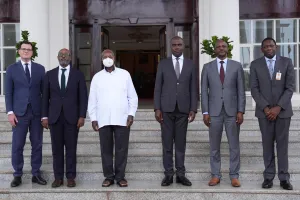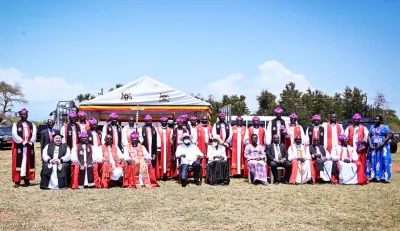
Tax authorities in Uganda and South Sudan have reached an agreement to jointly implement newly introduced digital permits along their shared borders.
Early this year, South Sudan unveiled an electronic permit system covering all incoming goods. Although some sections of the business community pushed back, officials maintain the reform is essential for curbing smuggling, cargo diversion, and revenue loss.
During a recent joint event, senior leaders from the South Sudan Revenue Authority (SSRA) and the Uganda Revenue Authority (URA) launched the South Sudan Electronic Cargo Tracking System and formally inaugurated use of the E-permit platform. The system requires that taxes on imports coming from East African Community states such as Uganda and Kenya be settled before goods leave the loading point. According to authorities, this measure is designed to reduce delays, enhance transparency, and curb revenue leakages, especially for high-risk products like cigarettes, alcohol, cosmetics, electronics, motor vehicles, and hookah tobacco (shisha).
On 20th November, SSRA Commissioner General William Anyuon Kuol issued a memo instructing customs personnel, traders, transporters, and clearing agents to strictly adhere to the digital requirements. His notice reiterated earlier coordination between SSRA and URA, making clear that no cargo will be admitted into South Sudan without an authorized e-permit. Only the SSRA Commissioner General may issue exemptions, and even such exceptions must be entered into the e-permit system so URA can electronically seal and monitor the shipment.
“Any trader who changes the final destination of goods from DR Congo to South Sudan must also follow the e-permit procedures and get fresh approval,” Kuol warned. He added that the directive takes effect immediately and that noncompliance may result in penalties, delays, or denial of clearance.
The e-permit initiative forms part of a broader digital cargo monitoring framework launched by South Sudan this year. Working alongside the tamper-proof Electronic Cargo Tracking System (ECTS), it aims to prevent trucks ferrying South Sudan-bound goods from diverting back into Uganda or other areas, where untaxed items often end up on local markets. South Sudanese authorities say such diversion has drained the country of billions of shillings, while Uganda continues to contend with smuggled fuel and illegal cigarettes.
According to Diing Majur, an Assistant Commissioner at SSRA, these reforms were long overdue. “For many years, South Sudan has lost revenue because of weak border controls and manual paper systems,” she said. “The e-permit finally gives us real-time information and helps us stop people who take advantage of the old loopholes.” She noted that the system now places South Sudan in line with regional practices in Kenya, Uganda, Rwanda, Tanzania, and Ghana, countries that have enjoyed reduced smuggling and increased revenue after adopting similar digital solutions.
URA’s Commissioner for Enforcement, Godson Mwesigye, told reporters that Uganda has already seen a drop in contraband. “We used to destroy illegal cigarettes worth about 10 billion shillings every year,” he said. “But since the digital tracking system started in March, smuggling has dropped sharply, especially in northern Uganda.” He added that illicit fuel diversion has also declined, with enforcement teams recovering tens of thousands of liters in recent months.
Mwesigye acknowledged that some traders and clearing agents struggled with the rollout due to limited sensitization, causing early delays. However, he noted that most resistance comes from individuals who previously benefited from smuggling schemes. Some have even launched online smear campaigns against the system. One false allegation accused him of involvement in South Sudanese political changes. “I have never been to Juba,” he said. “I am a Ugandan doing my job. It is shocking to see my name dragged into South Sudan politics just because we are enforcing a system that improves transparency.”
SSRA records show that since March, 2,730 consignments worth roughly USD 17 million have been processed through the e-permit platform, while more than 14,763 consignments valued at about USD 92 million moved outside the system, highlighting the extent of the compliance gap. Majur said this discrepancy underscores the need for stronger enforcement. “The fact that we can now identify these discrepancies is a major achievement. Before digitalization, we had no reliable data.”
Officials from both countries agree that full implementation of the new system will help block illegal goods from entering Uganda, give South Sudan credible data for planning and taxation, protect compliant traders from unfair competition, minimize border delays, and strengthen the trade corridor between the two nations. South Sudan is Uganda’s largest regional export destination, taking nearly 80% of its formal exports, including fuel, food, beverages, household items, and cement.
“The system is here to stay,” Majur said. “Those who oppose it may shout now, but they will not stop the progress. Digital systems are the future of trade.”













Phillip Baraka
Leave a Comment
Your email address will not be published.